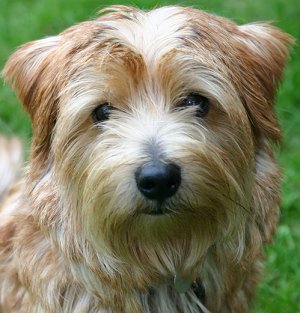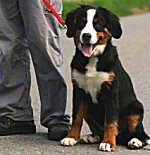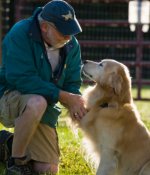Norfolk Terriers: What's Good About 'Em, What's Bad About 'Em
Norfolk Terrier temperament, personality, training, behavior, pros and cons, advice, and information, by Michele Welton, Dog Trainer, Behavioral Consultant, Author of 15 Dog Books

True representatives of what a terrier is supposed to be, Norfolk Terriers are full of fire and stubborn assertiveness. Yet they are more agreeable and companionable than some other terriers.
The Norfolk Terrier can adapt to any home with moderate exercise (brisk walks and active play sessions) and lots of companionship. These sociable dogs like to be with their owners and demand full participation in all activities.
Their reaction to strangers may be friendly, but is more often a bit reserved. Because of this, Norfolk Terriers do need more socialization than some other terriers, so their natural caution doesn't become exaggerated. These alert dogs make excellent watchdogs, but are not aggressive.
Norfolk Terriers usually get along (though can be a bit jealous, possessive, and bossy) with other dogs and cats in the family. Being true terriers, they tend to be feisty with strange pets.
Norfolk Terriers require a leash or fence at all times, as they are inquisitive and independent dogs with strong chasing instincts.
To the casual eye, the Norfolk Terrier is virtually identical to the Norwich Terrier, with the most obvious difference being ear carriage The Norfolk has drop ears, while the Norwich has pricked ears. In temperament, some terrier enthusiasts say the Norfolk Terrier has a feistier temperament and is "busier" than the Norwich, but it's really a matter of individual personality.
If you want a dog who...
- Is small, yet sturdy and tough – not a delicate lapdog
- Has a natural appearance
- Needs only moderate exercise
- Makes a keen watchdog
- Doesn't shed too much
- Co-exists with other pets more willingly than some other terriers
A Norfolk Terrier may be right for you.
If you don't want to deal with...
- The dynamic terrier temperament (see full description below)
- Providing enough exercise and activities to keep them busy
- Timidity when not socialized enough
- Potential aggression toward other animals – chasing instincts
- Stubbornness
- Digging holes
- Barking
- Regular clipping of the wiry coat
- A considerable number of potential health problems
- Waiting lists (hard to find) and a high price tag
A Norfolk Terrier may not be right for you.
 |
Dog Breed Traits – Which Traits Are Right For You? In this brand new series, I'll help you decide which dog breed traits would best suit you and your family, your home and yard, and your lifestyle, so you can choose the best dog breed for your family. |
Keep in mind that the inheritance of temperament is less predictable than the inheritance of physical traits such as size or shedding. Temperament and behavior are also shaped by raising and training.
FREE eBooks by Michele Welton
![]() "Respect Training for Puppies" and "Teach Your Dog 100 English Words" are free step by step guides to teaching your pup to be calm and well-behaved.
"Respect Training for Puppies" and "Teach Your Dog 100 English Words" are free step by step guides to teaching your pup to be calm and well-behaved.
![]() "11 Things You Must Do Right To Keep Your Dog Healthy and Happy" is a free guide to keeping your dog mentally, physically, and emotionally happy and healthy so you can enjoy a longer lifetime of companionship.
"11 Things You Must Do Right To Keep Your Dog Healthy and Happy" is a free guide to keeping your dog mentally, physically, and emotionally happy and healthy so you can enjoy a longer lifetime of companionship.

- You can avoid some negative traits by choosing an ADULT dog from an animal shelter or rescue group. With an adult dog, you can easily see what you're getting, and plenty of adult Norfolks have already proven themselves not to have negative characteristics.
- If you want a puppy, you can avoid some negative traits by choosing the right breeder and the right puppy.
More traits and characteristics of the Norfolk Terrier
If I was considering a Norfolk Terrier, I would be most concerned about...
- The dynamic terrier temperament. Most terrier breeds are remarkably similar. The same words are used over and over – quick to bark, quick to chase, lively, bossy, feisty, scrappy, clever, independent, stubborn, persistent, impulsive, intense.
I don't recommend terriers for home with small children. Many terriers will not tolerate any nonsense from little life forms whom they consider to be below themselves in importance. Many terriers are quick to react to teasing, and even to the normal clumsiness that comes with small children (accidental squeezing of their ears or stepping on their paw). Many terriers are possessive of their food and toys and will defend these from all comers, including children.
- Possible animal aggression. Norfolk Terriers are often more tolerant toward other dogs and cats than many other terriers are. Especially dogs and cats who belong to their own family. However, many Norfolk Terriers are dominant or aggressive toward strange dogs and have strong instincts to chase and seize small fleeing creatures.
- Providing enough socialization. Norfolk Terriers tend to be a bit standoffish with strangers, so they need extensive exposure to people and to unusual sights and sounds. Otherwise they may end up shy or suspicious.
- Mind of their own. Norfolk Terriers must be taught at an early age that they are not the rulers of the world. The toughness that makes them suited to killing vermin can frustrate you when you try to teach them anything. Norfolk Terriers can be stubborn and dominant (they want to be the boss) and will make you prove that you can make them do things. You must show them, through absolute consistency, that you mean what you say.
- Barking. Terriers are often too quick to sound the alarm at every new sight and sound. You have to be equally quick to stop them. This means you must establish the right relationship between your Norfolk Terrier and yourself, where you are the leader and he is the follower. This is called Respect Training. Read my free online training programs.
- Grooming. Norfolk Terriers require clipping and trimming every few months. Breed purists may say that terrier coats should never be clipped because it makes the coat softer and more prone to matting. Instead they advocate hand-stripping (each dead hair pulled out so a new one can grow in its place). But in my opinion, stripping is too time-consuming and uncomfortable for the dog. Many groomers won't do it anymore. For pet dogs, I think clipping is just fine.
- Health problems. Norfolk Terriers can suffer from itchy skin conditions, joint diseases, eye diseases, epilepsy, and heart disease. Read more about Norfolk Terrier Health.
My best-selling books – now available FREE on my website
 Respect Training For Puppies: 30 seconds to a calm, polite, well-behaved puppy is for puppies 2 to 18 months old. Your puppy will learn the 21 skills that all family dogs need to know. Click here to read for free.
Respect Training For Puppies: 30 seconds to a calm, polite, well-behaved puppy is for puppies 2 to 18 months old. Your puppy will learn the 21 skills that all family dogs need to know. Click here to read for free. Teach Your Dog 100 English Words is a unique Vocabulary and Respect Training Program that will teach your adult dog to listen to you and do what you say. Click here to read for free.
Teach Your Dog 100 English Words is a unique Vocabulary and Respect Training Program that will teach your adult dog to listen to you and do what you say. Click here to read for free. 11 Things You Must Do Right To Keep Your Dog Healthy and Happy helps your dog live a longer, healthier life. Get my honest advice about all 11 Things before you bring home your new puppy, because some mistakes with early health care cannot be undone. Click here to read for free.
11 Things You Must Do Right To Keep Your Dog Healthy and Happy helps your dog live a longer, healthier life. Get my honest advice about all 11 Things before you bring home your new puppy, because some mistakes with early health care cannot be undone. Click here to read for free.Related posts you might enjoy






